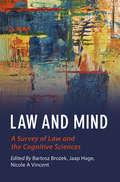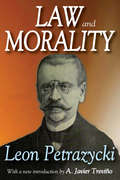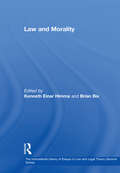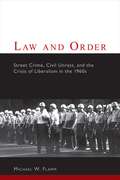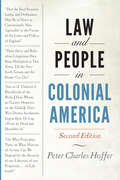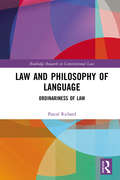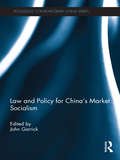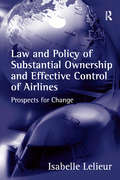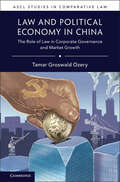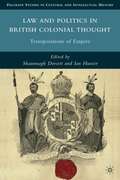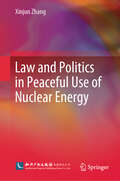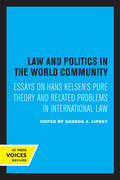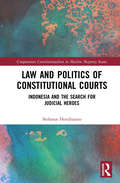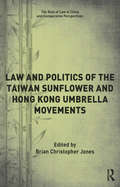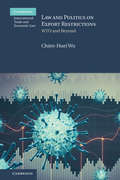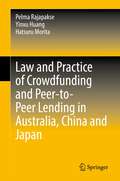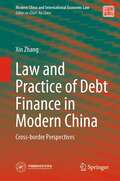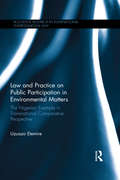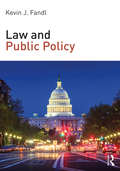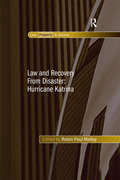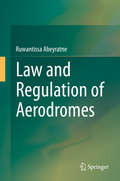- Table View
- List View
Law and Mind: A Survey of Law and the Cognitive Sciences (Law and the Cognitive Sciences)
by Nicole A. Vincent Jaap Hage Bartosz BrożekAre the cognitive sciences relevant for law? How do they influence legal theory and practice? Should lawyers become part-time cognitive scientists? The recent advances in the cognitive sciences have reshaped our conceptions of human decision-making and behavior. Many claim, for instance, that we can no longer view ourselves as purely rational agents equipped with free will. This change is vitally important for lawyers, who are forced to rethink the foundations of their theories and the framework of legal practice. Featuring multidisciplinary scholars from around the world, this book offers a comprehensive overview of the emerging field of law and the cognitive sciences. It develops new theories and provides often provocative insights into the relationship between the cognitive sciences and various dimensions of the law including legal philosophy and methodology, doctrinal issues, and evidence.
Law and Morality: Leon Petrazycki (Twentieth Century Legal Philosophy Ser. #7)
by A. Javier Trevino Leon PetrazyckiIn analyzing the socio-psychic nature and operations of intuitive legal rules, Petrazycki formulates a theory of law around five conceptual themes: anti-formalism, imperative-attributive legal relationships, law's functional control, law's subjective reality and morality. Petrazycki presents the two ways by which law coordinates and regulates social conduct as through its distributive and organizing functions. Law and Morality has a basic objective: to analyze interrelations between positive and intuitive law. Petrazycki's socio-psychic orientation toward law is behavioral as well as thoughtful. He finds the most suitable methods for obtaining knowledge about legal experiences to be internal and external observation. His technique of introspection is similar to Max Weber's conceptual method. Petrazycki distinguishes between two kinds of interpretive understanding. External observation involves deriving the meaning of an act or symbolic expression from immediate observation without reference to any broader context, and internal observation involves placing the particular act in a broader context of meaning involving facts that cannot be derived from a particular act or expression. Petrazycki's socio-legal ideas remain relevant in today's society. His arguments concerning the global expansion of human love have an attraction for those working towards a better world. In the context of positive psychology and the growing happiness industry, Petrazycki's ideas will compel legal scholars to consider his arguments. Petrazycki's work stands out for the scientific ambitions and systematic nature of his thought as well as the influence of his work on later scholars in the sociology of law.
Law and Morality: Proceedings Of The 21st World Congress Of The International Association For Philosophy Of Law And Social Philosophy (ivr); Lund, Sweden, 12-18 August 2003 (The\international Library Of Essays In Law And Legal Theory (second Series) Ser. #98)
by Kenneth Einar Himma and Brian BixThis volume collects many of the key essays exploring the possible relationships between the concepts of law and morality, a central concern of contemporary philosophizing about law. It is organized around five conceptual issues: classical natural law theory; legal positivism's separability thesis; Ronald Dworkin's constructive interpretivism; inclusive legal positivism's assertion that there can be legal systems with moral criteria of legality; and the relevance of morality and moral theorizing in theorizing about the concept of law and associated legal concepts. Each of the essays makes an important contribution toward addressing these issues.
Law and Order in Ancient Athens
by Adriaan LanniThe classical Athenian 'state' had almost no formal coercive apparatus to ensure order or compliance with law: there was no professional police force or public prosecutor, and nearly every step in the legal process depended on private initiative. And yet Athens was a remarkably peaceful and well-ordered society by both ancient and contemporary standards. Why? Law and Order in Ancient Athens draws on contemporary legal scholarship to explore how order was maintained in Athens. Lanni argues that law and formal legal institutions played a greater role in maintaining order than is generally acknowledged. The legal system did encourage compliance with law, but not through the familiar deterrence mechanism of imposing sanctions for violating statutes. Lanni shows how formal institutions facilitated the operation of informal social control in a society that was too large and diverse to be characterized as a 'face-to-face community' or 'close-knit group'.
Law and Order: Street Crime, Civil Unrest, and the Crisis of Liberalism in the 1960s (Columbia Studies in Contemporary American History)
by Michael FlammLaw and Order offers a valuable new study of the political and social history of the 1960s. It presents a sophisticated account of how the issues of street crime and civil unrest enhanced the popularity of conservatives, eroded the credibility of liberals, and transformed the landscape of American politics. Ultimately, the legacy of law and order was a political world in which the grand ambitions of the Great Society gave way to grim expectations.In the mid-1960s, amid a pervasive sense that American society was coming apart at the seams, a new issue known as law and order emerged at the forefront of national politics. First introduced by Barry Goldwater in his ill-fated run for president in 1964, it eventually punished Lyndon Johnson and the Democrats and propelled Richard Nixon and the Republicans to the White House in 1968. In this thought-provoking study, Michael Flamm examines how conservatives successfully blamed liberals for the rapid rise in street crime and then skillfully used law and order to link the understandable fears of white voters to growing unease about changing moral values, the civil rights movement, urban disorder, and antiwar protests.Flamm documents how conservatives constructed a persuasive message that argued that the civil rights movement had contributed to racial unrest and the Great Society had rewarded rather than punished the perpetrators of violence. The president should, conservatives also contended, promote respect for law and order and contempt for those who violated it, regardless of cause. Liberals, Flamm argues, were by contrast unable to craft a compelling message for anxious voters. Instead, liberals either ignored the crime crisis, claimed that law and order was a racist ruse, or maintained that social programs would solve the "root causes" of civil disorder, which by 1968 seemed increasingly unlikely and contributed to a loss of faith in the ability of the government to do what it was above all sworn to do-protect personal security and private property.
Law and People in Colonial America
by Peter Charles HofferAn essential, rigorous, and lively introduction to the beginnings of American law.How did American colonists transform British law into their own? What were the colonies' first legal institutions, and who served in them? And why did the early Americans develop a passion for litigation that continues to this day? In Law and People in Colonial America, Peter Charles Hoffer tells the story of early American law from its beginnings on the British mainland to its maturation during the crisis of the American Revolution. For the men and women of colonial America, Hoffer explains, law was a pervasive influence in everyday life. Because it was their law, the colonists continually adapted it to fit changing circumstances. They also developed a sense of legalism that influenced virtually all social, economic, and political relationships. This sense of intimacy with the law, Hoffer argues, assumed a transforming power in times of crisis. In the midst of a war for independence, American revolutionaries used their intimacy with the law to explain how their rebellion could be lawful, while legislators wrote republican constitutions that would endure for centuries.Today the role of law in American life is more pervasive than ever. And because our system of law involves a continuing dialogue between past and present, interpreting the meaning of precedent and of past legislation, the study of legal history is a vital part of every citizen's basic education. Taking advantage of rich new scholarship that goes beyond traditional approaches to view slavery as a fundamental cultural and social institution as well as an economic one, this second edition includes an extensive, entirely new chapter on colonial and revolutionary-era slave law. Law and People in Colonial America is a lively introduction to early American law. It makes for essential reading.
Law and Philosophy of Language: Ordinariness of Law (Routledge Research in Constitutional Law)
by Pascal RichardAcademic legal production, when it focuses on the study of law, generally grasps this concept on the basis of a reference to positive law and its practice. This book differs clearly from these analyses and integrates the legal approach into the philosophy of normative language, philosophical realism and pragmatism. The aim is not only to place the examination of law in the immanence of its practice, but also to take note of the fact that legal enunciation must be taken seriously. In order to arrive at this analysis, it is necessary to go beyond traditional perspectives and to base reflection on an investigation of the conditions for enunciating law in our democracies. This analysis thus offers a renewal of the ethics inherent in the action of jurists and an original reflection on the role of certain legal tools such as concepts, categories, or "provisions". In this sense, the work nourishes its originality not only by the transversality of its approach, but also by the will to situate legal thought in concrete forms of its implementation. The book will be essential reading for academics working in the areas of legal theory, legal philosophy and constitutional theory.
Law and Piety in Medieval Islam
by Megan H. ReidThe Ayyubid and Mamluk periods were two of the most intellectually vibrant in Islamic history. Megan H. Reid's book, which traverses three centuries from 1170 to 1500, recovers the stories of medieval men and women who were renowned not only for their intellectual prowess but also for their devotional piety. Through these stories, the book examines trends in voluntary religious practice that have been largely overlooked in modern scholarship. This type of piety was distinguished by the pursuit of God's favor through additional rituals, which emphasized the body as an instrument of worship, and through the rejection of worldly pleasures, and even society itself. Using an array of sources including manuals of law, fatwa collections, chronicles, and obituaries, the book shows what it meant to be a good Muslim in the medieval period and how Islamic law helped to define holy behavior. In its concentration on personal piety, ritual, and ethics the book offers an intimate perspective on medieval Islamic society.
Law and Policy for China's Market Socialism (Routledge Contemporary China Series)
by John GarrickThis edited volume presents fresh empirical research on the emerging outcomes of China’s law reforms. The chapters examine China’s ‘going out’ policy by addressing the ways in which the underpinning legal reforms enable China to pursue its core interests and broad international responsibilities as a rising power. The contributors consider China’s civil and commercial law reforms against the economic backdrop of an outflow of Chinese capital into strategic assets outside her own borders. This movement of capital has become an intriguing phenomenon for both ongoing economic reform and its largely unheralded underpinning law reforms. The contributors ask probing questions about doing business with China and highlight the astonishing escalation of China’s outbound foreign direct investment (OFDI). Law and Policy for China's Market Socialism includes contributions from leading China-law scholars and specialist practitioners from the People’s Republic of China, Hong Kong, the United States, the United Kingdom and other countries who all extend the examination of powerful influences on China’s law reforms into new areas. Given the forecast for the growth of China’s domestic market, those wishing to gain a better understanding and seeking success in the world's most dynamic marketplace will benefit greatly from reading this book. This book is essential reading for anyone interested in Chinese economics and business, Chinese Law, Chinese politics and commercial law.
Law and Policy of Substantial Ownership and Effective Control of Airlines: Prospects for Change
by Isabelle LelieurThe principle of airline substantial ownership and effective control is one of the biggest impediments to the air transport industry growth. Legitimately included in the bilateral agreements since 1946 for national security reasons, States have maintained the principle over the years and used it as a protectionist tool, as well as a bargaining chip. Today, considering that liberalization and globalization concepts are already well-established in the biggest industrial sectors, and a large number of cross-border investments occurs in most of the service sectors through mergers and acquisitions, the time is ripe to remove national restrictions on foreign investments from the airline industry. This comprehensive book identifies those factors that still justify the imposition of national ownership restrictions on airlines and examines the prospects for change in the current policies and regulatory regimes that support them. The readership includes specialists in government departments of transportation, civil aviation authorities and agencies, international organizations, airline executives concerned with general management, economic, legal and public affairs, aviation lawyers, airline pilot associations, law schools concerned with international aviation law.
Law and Political Economy in China: The Role of Law in Corporate Governance and Market Growth (ASCL Studies in Comparative Law)
by Tamar Groswald OzeryApplying a novel theoretical approach, Tamar Groswald Ozery combines law and political economy to deconstruct the role of law in China's market development since 1978. The book examines how economic and administrative powers within China's Party-state system have been legally and politically configured throughout China's growth process. Using a vast range of primary sources, Ozery illuminates how the law acts as a mediating institution that translates and gives shape to the relations between politics and economics. Using the evolution of public firms and corporate governance as a case study, Ozery illustrates the complex relationships between law, politics, and economic development, and sheds new light on the possible varieties of growth-supporting governance institutions in firms. By studying China's distinct market experience through the lens of law and political economy, Ozery offers a significant contribution to development studies, comparative corporate governance, and interdisciplinary discussions about China as a growth model.
Law and Politics in British Colonial Thought: Transpositions of Empire
by Ian Hunter Shaunnagh DorsettA collection that focuses on the role of European law in colonial contexts and engages with recent treatments of this theme in known works written largely from within the framework of postcolonial studies, which implicitly discuss colonial deployments of European law and politics via the concept of ideology.
Law and Politics in Peaceful Use of Nuclear Energy
by Xinjun ZhangThis book analyzes the law and politics in the peaceful use of nuclear energy. The “inalienable right” as provided for in Article IV of the Treaty on the Non-proliferation of Nuclear Weapons (NPT) has unexpectedly been an interpretation riddle, which has brought about many controversies among NPT Party States, like those in the 1970s between the U.S. and its allies, and today in the Iranian nuclear problem and in the North Korean nuclear crisis. This book offers a detailed review and analysis of the lifetime of the norm on the right to the peaceful use of nuclear energy: what factors give rise to a possible design of the dynamic treaty obligation, how they are made in drafting the relevant treaty provisions, and how subsequent practice plays a role in the interpretation. The usefulness of the general rule of interpretation is also challenged in this book, and an interdisciplinary perspective on interpretation is otherwise proposed to better understand the interplay of the law and politics in the nuclear nonproliferation regime.
Law and Politics in the World Community: Essays on Hans Kelsen's Pure Theory and Related Problems in International Law
by George A. LipskyThis title is part of UC Press's Voices Revived program, which commemorates University of California Press’s mission to seek out and cultivate the brightest minds and give them voice, reach, and impact. Drawing on a backlist dating to 1893, Voices Revived makes high-quality, peer-reviewed scholarship accessible once again using print-on-demand technology. This title was originally published in 1953.
Law and Politics of Constitutional Courts: Indonesia and the Search for Judicial Heroes (Comparative Constitutionalism in Muslim Majority States)
by Stefanus HendriantoThis book critically evaluates different models of judicial leadership in Indonesia to examine the impact that individual chief justices can have on the development of constitutional courts. It explores the importance of this leadership as a factor explaining the dynamic of judicial power. Drawing on an Aristotelean model of heroism and the established idea of judicial heroes to explore the types of leadership that judges can exercise, it illustrates how Indonesia’s recent experience offers a stark contrast between the different models. First, a prudential-minimalist heroic chief justice who knows how to enhance the Court’s authority while fortifying the Court’s status by playing a minimalist role in policy areas. Second, a bold and aggressive heroic chief justice, employing an ambitious constitutional interpretation. The third model is a soldier-type chief justice, who portrays himself as a subordinate of the Executive and Legislature. Contrary perhaps to expectations, the book’s findings show a more cautious initial approach to be the most effective. The experience of Indonesia clearly illustrates the importance of heroic judicial leadership and how the approach chosen by a court can have serious consequences for its success. This book will be a valuable resource for those interested in the law and politics of Indonesia, comparative constitutional law, and comparative judicial politics.
Law and Politics of the Taiwan Sunflower and Hong Kong Umbrella Movements (The Rule of Law in China and Comparative Perspectives)
by Brian Christopher JonesRarely do acts of civil disobedience come in such grand fashion as Taiwan’s Sunflower Movement and Hong Kong’s Umbrella Movement. The two protests came in regions and jurisdictions that many have underestimated as regards furthering notions of political speech, democratisation, and testing the limits of authority. This book breaks down these two movements and explores their complex legal and political significance. The collection brings together some of Asia’s, and especially Taiwan and Hong Kong’s, most prolific writers, many of whom are internationally recognised experts in their respective fields, to address the legal and political significance of both movements, including the complex questions they posed as regards democracy, rule of law, authority, and freedom of speech. Given that occupational type protests have become a prominent method for protesters to make their cases to both citizens and governments, exploring the legalities of these significant protests and establishing best practices will be important to future movements, wherever they may transpire. With this in mind, the book does not stop at implications for Taiwan and Hong Kong, but talks about its subject matter from a comparative, international perspective.
Law and Politics on Export Restrictions: WTO and Beyond (Cambridge International Trade and Economic Law)
by Chien-Huei WuDelving into export restrictive measures this book links the key areas of WTO law, public international law, investment and competition law to expose how and why WTO rules on export dimension are insufficient due to export bias; how public international law helps to justify their adoption or maintenance; and how investment and competition laws contribute to their regulation. Built on works on accession protocols and national security exceptions, this book goes beyond international trade law and looks into international political economy, competition and investment law. It contributes to debates in conceptualising public and private forms of export restrictions, appreciating the complementary nature of trade and competition law in disciplining them; capturing the dynamic between trade and investment policies for their effectuation and circumvention; and bridging trade law and public international law to better understand their impositions for political and diplomatic purposes with the invocation of the national security justification.
Law and Practice of Crowdfunding and Peer-to-Peer Lending in Australia, China and Japan
by Pelma Rajapakse Yinxu Huang Hatsuru MoritaThe revolution in financial technology (FinTech) has created many advancements in the lending and investment space across the world. Law and Practice of Crowdfunding and Peer-to-Peer Lending in Australia, China, and Japan is a timely publication as FinTech grows up and moved into the mainstream of finance in the last decade. Financial services is a highly regulated industry as it is the lifeblood of a modern economy. Pelma Rajapakse, Hatsuru Morita, and Yinxu Huang have done very solid work blazing a new trail in what is a new industry and how to regulate it properly instead of stifling innovation. They have carried out a deep exploration and a thorough compilation of research that will bring everyone up to date on what Australia, China, and Japan are planning and doing in the field of crowdfunding and peer-to-peer lending. In addition to peer-to-peer lending, the book focuses on laws and practices related to Central Bank digital currencies, cryptocurrency, Bitcoin, and Initial Coin Offerings (ICOs) which is very meaningful and forward-looking. The authors presented their thoughts in such clarity that, even those who lack familiarity with Asia-Pacific, will see how FinTech was growing in various ways driven by different factors. For example, peer-to-peer lending in Japan is mostly for small and medium enterprises. It was popular in China but cracked down by the authorities for a few years. It provides an alternative fundraising channel for the capital market in Australia. We also see a set of regulatory approaches among jurisdictions. Some countries draft new regulations, while others amend existing laws. The mechanism of the regulatory sandbox was introduced. As we know, one size does not fit all. What kind of best practices or lessons learned can we apply to our own jurisdiction? This book covers all available answers to date. This volume speaks highly of the quality and foresight of Pelma Rajapakse and her co-authors.
Law and Practice of Debt Finance in Modern China: Cross-border Perspectives (Modern China and International Economic Law)
by Xin ZhangThis book provides updated, full-picture analysis of the laws and practices of cross-border debt finance in the PRC. It is featured by the first-handed experiences of the author’s academic research and legal practice in this field over two decades. The author discusses legal and regulatory issues, transaction structures and documentation in relation to two debt finance products: loan and bond, covering the inbound structure (Chinese debtors’ raising funds from the international market) and the outbound structure (Chinese creditors’ supplying funds to the international market). For cross-border loans, this book thoroughly illustrates the foreign debt regulatory regime in the PRC and approaches the lending by Chinese banks to support exports and overseas investments under the “Belt and Road Initiative” (BRI). For cross-border bonds, it discusses how Chinese issuers, by designing various transaction structures, enter into the international bond market, and then researches the “opening-up” of Chinese bond market to both international issuers (for issuing “Panda Bonds”) and investors (for purchasing Chinese bonds). This book is used as an authoritative source for not only students and researchers, but also bankers and legal practitioners, who are interested in the Chinese debt finance market.
Law and Practice of Foreign Arbitration and Enforcement of Foreign Arbitral Awards in Pakistan
by Ahmad Ali GhouriPakistan has recently reformed its arbitration laws and laws on the recognition and enforcement of foreign arbitration agreements and awards. These reforms relate to both international commercial and investment arbitration. This book highlights the changes brought about by the recent enactments and explains the relationships between the old and new legislation. It provides a detailed and up-to-date analysis of Pakistani case law on foreign arbitration agreements and awards. Part I describes the background of arbitration laws in Pakistan. Part II explains the applicable substantive and procedural rules for the recognition and enforcement of foreign arbitration agreements and awards and other important issues, such as the severability of arbitration clauses from main agreements, questions of public policy, and interim measures supporting foreign arbitration. Part III analyses the recent enactments that implement the New York and the ICSID Conventions in Pakistan.
Law and Practice of Liability Management
by Apostolos Ath. GkoutzinisTender offers, exchange offers and consent solicitations in connection with debt securities are important instruments of corporate restructurings, corporate rescues, recapitalisations and other types of liability management of public and private companies. Although tender offers for shares, stocks and other equity securities are covered by a vast literature on public mergers, takeovers and acquisitions, the literature on liability management transactions for debt securities is scarce. Law and Practice of Liability Management rectifies this by providing a systematic treatise of the law relating to this significant aspect of the global capital market. It guides students and professionals through the complex legal and regulatory requirements applicable to these transactions, the increasing regulatory interest by the world's leading financial regulatory authorities, and recent innovations in the structuring, legal techniques and execution of the relevant transactions in international capital markets.
Law and Practice on Public Participation in Environmental Matters: The Nigerian Example in Transnational Comparative Perspective (Routledge Research in International Environmental Law)
by Uzuazo EtemirePublic participation has become a recurring theme and a topical issue in the field of international environmental law, with many multilateral environmental instruments calling on states to guarantee effectively the concept in their laws and practices. This book focuses on public participation in environmental governance, in terms of public access to environmental information and public participation in environmental decision-making processes. Drawing on the body of international best practice principles in environmental law and taking a comparative stance, Uzuazo Etemire takes Nigeria as a key case, evaluating its procedural laws and practices in relation to public access to information and participation in decision-making in environmental matters. In working to clarify and deepen understanding of the current status of environmental public participation rights in Nigeria, the book addresses key issues in environmental governance for developing and transitional countries and the potential for public participation to improve the state of the environment and public wellbeing. This book will be of great interest to undergraduate students (as further reading) and post-graduate students, academics, researchers, relevant government agencies and departments, policy-makers and NGOs in the fields of international environmental law, environmental justice, environmental/natural resource management, development studies and international finance.
Law and Public Policy
by Kevin J. FandlLaws exist to incentivize us to act in a certain manner, in accordance with the policies that our community has deemed right for us. And when we disagree with those laws, we must re-examine our policies, and thus our beliefs and ideas, to decide whether our community has changed. This is a book about law and public policy—about the ideas and the rules we build to implement those rules. While similar books have looked at public policy and public administration in an effort to explain how the government works, and others have considered the foundations of the legal system to understand the rulemaking institutions, this book takes a different approach. In this ground-breaking new textbook, author Kevin Fandl develops a complete picture of society, from idea to action -- by examining laws through the lens of policy, and vice versa. This holistic approach gives readers a chance to see not only why certain rules exist, but how those rules evolved over time and the events that inspired them. It offers readers an opportunity not only to see but also to participate in the process of forming the structures that shape our society. This textbook is divided into two sections. The first section provides readers with the tools that they will need to digest the policies and laws that surround them. These tools include a historical deep dive into the foundations of the governance structure in the United States and beyond, an important examination of civics and a reminder of the importance of engaging in the policymaking process, a careful breakdown of the institutions that form the backbone of the law and policy-making institutions in the United States, and finally critical thinking including practical tools to find reliable sources for news, research, and other types of information. The second section of the text is comprised of subject-matter analyses. These subject-based chapters, written by experts on the topic at hand begin with a historical perspective, followed by a careful examination of the key policies and laws that inform that field. Each chapter highlights key vocabulary, provides practical vignettes to add context to the writing, explores a unique global component to compare perspectives from communities worldwide, and includes a number of discussion questions and recommended readings for further examination. This textbook is tailored specifically for undergraduate and graduate students of public policy, to introduce them to the role of law and legal institutions as facilitators and constraints on public policy, exploring those laws in a range of relevant policy contexts with the help of short case studies.
Law and Recovery From Disaster: Hurricane Katrina (Law, Property and Society)
by Robin Paul MalloyIn August of 2005, Hurricane Katrina hit the Gulf Coast of the United States, directly affecting 1.5 million people. Only one year earlier, an Indian Ocean tsunami struck Indonesia, destroying or damaging more than 370,000 homes. As forces of nature, hurricanes, tsunamis, earthquakes and floods are not limited to occurrences in any one community or any one country. In Law and Recovery from Disaster: Hurricane Katrina, attention is focused on the ability of law and legal institutions to not only survive such disasters but to effectively facilitate recovery. Using Hurricane Katrina as a lens, contributors address a wide range of issues of interest to people concerned about property law, disaster preparedness, housing, insurance, small business recovery, land use planning and the needs of people with disabilities. While Hurricane Katrina is the focal point for discussion, the lessons learned are readily applicable to a variety of disaster situations in a wide range of global settings.
Law and Regulation of Aerodromes
by Ruwantissa AbeyratneThis book encapsulates in detail the principles pertaining to legal and regulatory aspects of aerodromes. As the title denotes, it discusses the various aspects of the structure and functioning of an aerodrome and the complexities involved. It focuses on the law and regulation of aerodrome certification and planning, aerodrome services, financial and economic planning, security, management and governance. The airport industry is one of the fastest growing within the aviation industry, requiring innovation and creativity in management. This in turn has called for an increased focus on advanced management programmes for airport managers and lawyers. The Airport Management Professional Accreditation Programme (AMPAP) offered worldwide by the International Civil Aviation Organization and Airports Council International, and the Angkasa Pura II Airport Management Excellence Programme of Indonesia are two such initiatives which give airport professionals a sound grounding on the principles and techniques of management and law.
